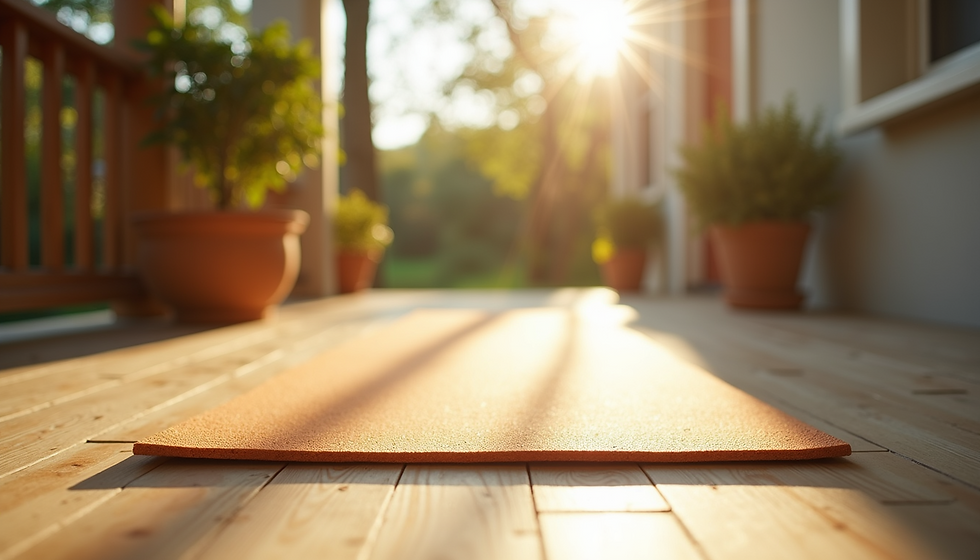Overstimulated and Overlooked: Mental Health, ADHD, and the Journey Back to Myself
- Katie Cousins
- Jun 17, 2025
- 4 min read
Updated: Jul 15, 2025
I’ve struggled with cycles of severe depression and anxiety for most of my life. Diagnosed with anxiety as a teenager, severe depression in college, and finally ADHD at the age of 33, I often wonder how different things might have been if I’d been properly diagnosed and supported as a child.
That late diagnosis was both a relief and a heartbreak. It made sense of so much, but it also forced me to grieve the years I spent thinking I was lazy, emotional, too much, or not enough.
The Mental Load You Can’t See
My anxiety is tightly woven with overstimulation. I juggle multiple jobs, a family, and a mental load that never seems to pause:
Dinner.
Slack messages that sound like someone’s mad at me.
Dishes.
The word I just lost mid-sentence.That noise I can’t identify.
Vet bills.
Follow-ups.
Automatic negative thoughts.
That feeling that I forgot something important (because I probably did).
My mind is a spiderweb of guilt, worry, doubt, and “don’t forgets.” It rarely rests. And that chronic tension, the constant hum of overthinking, has been my baseline for years.
The Power of a Name
Getting an ADHD diagnosis as an adult, especially as a woman, is complicated. It can feel like both liberation and loss. You gain context, but you also see, clearly, for the first time, how much time and energy you’ve spent masking, coping, and blaming yourself.
Women and girls are often missed or misdiagnosed. We internalize rather than disrupt. We’re praised for being "good" and "quiet" while silently drowning in mental chaos. I was a high-achieving perfectionist with straight A’s and panic attacks. No one ever thought to look deeper.
Yoga Didn’t Cure My ADHD—But It Helps Me Cope
I teach and practice yoga several times a week, not for the aesthetics or the flexibility, but for the chance to pause, to reset, and to remember that I am not my thoughts.
For my ADHD brain, yoga has become both an anchor and a mirror.

It helps me regulate overstimulation. Moving intentionally, focusing on breath, and tuning into sensation quiets the noise and gives my nervous system something steady to hold onto.
It builds interoception. Learning to notice how my body feels in the moment helps me catch anxiety or shutdowns before they spiral.
It interrupts negative thought loops. Even a 10-minute flow breaks the cycle of rumination and reminds me I am here, not lost in fear or the future.
It gives me grace. Yoga teaches compassion, not performance. And that’s something I desperately needed after decades of self-criticism.
I still take daily prescriptions to help regulate my mood and nervous system. I still forget appointments and panic over unread emails. However, yoga provides me with a way to reconnect with myself, even amid chaos.
For Her, I Speak Up
I’m also vigilant about my daughter’s mental health. If she ever shows signs of what I lived with in silence: restlessness, overwhelm, and emotional spirals, I want her to feel seen. I want her to know there’s nothing wrong with how her brain works.
Mental healthcare should be free, accessible, and stigma-free for everyone, everywhere, at any time, and any age.
If you’re reading this and something resonates, you’re not alone. You’re not broken. And you don’t have to muscle through it in silence.
Mental Health Stats
🧠 1 in 5 women in the US experience a mental health condition compared to 1 in 8 men. Women are more likely to face mental health issues due to unique stressors such as gender discrimination, violence, and balancing multiple roles.
🧠 40 million adults are affected by anxiety disorders in the US every year. Women are nearly 2x as likely to be affected as men.
🧠 Women are 3 times more likely to experience PTSD than men, often due to higher rates of sexual assault and domestic violence.
🧠 Nearly 50% of mothers with young children reported feeling significant stress/anxiety compared to 34% of fathers.
🧠 264 million people globally are diagnosed with depression each year, with women experiencing depression at higher rates than men.
🧠 Postpartum depression affects about 1 in 7 women after childbirth.
🧠 Only 4.4% of adults are "late-"diagnosed with ADHD, compared to 8-10% of children. Young girls and women with ADHD are frequently underdiagnosed or misdiagnosed, leading to untreated symptoms and significant impacts on their daily lives.
🧠 25-50% of children with ADHD have mothers who also have the condition, highlighting the importance of addressing maternal mental health and early diagnosis.
🧠 Up to 50% of women with mental health conditions such as ADHD and depression go undiagnosed or misdiagnosed, leading to a lack of proper treatment and support.
xo,
Katie Cousins
e-RYT Certified Yoga Instructor
Pittsboro, NC
Sources:
National Institute of Mental Health (NIMH) - Postpartum Depression Facts: https://www.nimh.nih.gov/health/publications/postpartum-depression-facts
Anxiety and Depression Association of America (ADAA) - Women and Anxiety: https://adaa.org/understanding-anxiety/women-and-anxiety
National Center for PTSD - PTSD in Women: https://www.ptsd.va.gov/understand/common/common_women.asp
American Psychological Association (APA) - Stress in America: https://www.apa.org/news/press/releases/stress/2019/stress-america-2019.pdf
Centers for Disease Control and Prevention (CDC) - Data and Statistics about ADHD: https://www.cdc.gov/ncbddd/adhd/data.html
American Psychiatric Association (APA) - What Is ADHD?: https://www.psychiatry.org/patients-families/adhd/what-is-adhd
National Institute of Mental Health (NIMH) - Attention-Deficit/Hyperactivity Disorder (ADHD): https://www.nimh.nih.gov/health/statistics/attention-deficit-hyperactivity-disorder-adhd
Anxiety and Depression Association of America (ADAA) - Facts & Statistics: https://adaa.org/understanding-anxiety/facts-statistics
World Health Organization (WHO) - Depression: https://www.who.int/news-room/fact-sheets/detail/depression
National Institute of Mental Health (NIMH) - Women and Mental Health: https://www.nimh.nih.gov/health/topics/women-and-mental-health
CHADD (Children and Adults with Attention-Deficit/Hyperactivity Disorder) - ADHD Facts and Statistics: https://chadd.org/about-adhd/general-prevalence/
Substance Abuse and Mental Health Services Administration (SAMHSA) - Women and Mental Health: https://www.samhsa.gov/women-children-families/women

























Comments